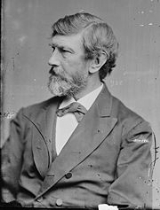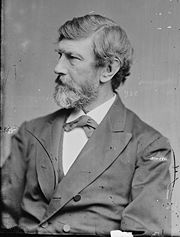
William D. Kelley
Encyclopedia

Republican Party (United States)
The Republican Party is one of the two major contemporary political parties in the United States, along with the Democratic Party. Founded by anti-slavery expansion activists in 1854, it is often called the GOP . The party's platform generally reflects American conservatism in the U.S...
member of the U.S. House of Representatives from Pennsylvania
Pennsylvania
The Commonwealth of Pennsylvania is a U.S. state that is located in the Northeastern and Mid-Atlantic regions of the United States. The state borders Delaware and Maryland to the south, West Virginia to the southwest, Ohio to the west, New York and Ontario, Canada, to the north, and New Jersey to...
. Kelley was a lifelong advocate of civil rights, social reform, and labor protection.
Early life
William Darrah Kelley was born in Philadelphia, PennsylvaniaPhiladelphia, Pennsylvania
Philadelphia is the largest city in the Commonwealth of Pennsylvania and the county seat of Philadelphia County, with which it is coterminous. The city is located in the Northeastern United States along the Delaware and Schuylkill rivers. It is the fifth-most-populous city in the United States,...
, the son of Hannah and David Kelley; his father died when he was two. His daughter Florence Kelley
Florence Kelley
Florence Kelley was an American social and political reformer. Her work against sweatshops and for the minimum wage, eight-hour workdays, and children's rights is widely regarded today.-Family:...
told of an incident immediately after the death. Since the law at the time said that all a man's possessions must be sold to discharge his debts, with no exemptions allowed for widows or orphans, all of the family's treasures were spread out on tables to be auctioned off. A "substantial" Quaker woman appeared with two large baskets, filled them with as much as she could carry, and walked away expressing indignation that "Friend Hannah Kelley should not have returned precious heirlooms" to her. Weeks later, after the auction, the woman sneaked the treasures back to the Kelley family.
His mother opened a boarding house to support her children. William Kelley started working at eleven to support the family, apprenticing as a jeweller and educating himself in law.
Kelley was nicknamed "Pig-Iron Kelley" due to his role as a major spokesman in Congress for Pennsylvania's iron interests.
Career
Kelley was admitted to the bar in Philadelphia in 1841. In 1846 Governor ShunkFrancis R. Shunk
Francis Rawn Shunk was the tenth Governor of Pennsylvania from 1845 to 1848. Born into a poor family, Shunk served in the Pennsylvania militia during the War of 1812...
of Pennsylvania appointed him a judge of the Court of Common Pleas. He served as a judge of the Philadelphia County
Philadelphia County, Pennsylvania
-History:Tribes of Lenape were the first known occupants in the area which became Philadelphia County. The first European settlers were Swedes and Finns who arrived in 1638. The Netherlands seized the area in 1655, but permanently lost control to England in 1674...
Court of Common Pleas
Pennsylvania Courts of Common Pleas
The Pennsylvania Courts of Common Pleas are the trial courts of the Unified Judicial System of Pennsylvania .The Courts of Common Pleas are the trial courts of general jurisdiction in the state....
from 1846-1856.
William D. Kelley came to national attention after his 1854 speech against the slave trade, "Slavery in the Territories", was published and widely read.
After the repeal of the Missouri Compromise
Missouri Compromise
The Missouri Compromise was an agreement passed in 1820 between the pro-slavery and anti-slavery factions in the United States Congress, involving primarily the regulation of slavery in the western territories. It prohibited slavery in the former Louisiana Territory north of the parallel 36°30'...
by the Kansas-Nebraska Act
Kansas-Nebraska Act
The Kansas–Nebraska Act of 1854 created the territories of Kansas and Nebraska, opening new lands for settlement, and had the effect of repealing the Missouri Compromise of 1820 by allowing settlers in those territories to determine through Popular Sovereignty if they would allow slavery within...
in 1854, Kelley quit the Democratic Party.
Founding the Republican Party
In 1854 Kelley was one of the founders of the Republican PartyHistory of the United States Republican Party
The United States Republican Party is the second oldest currently existing political party in the United States after its great rival, the Democratic Party. It emerged in 1854 to combat the Kansas Nebraska Act which threatened to extend slavery into the territories, and to promote more vigorous...
.
Kelley was elected as a Republican to Congress in 1860 and served from March 4, 1861, until his death in Washington, D.C.
Washington, D.C.
Washington, D.C., formally the District of Columbia and commonly referred to as Washington, "the District", or simply D.C., is the capital of the United States. On July 16, 1790, the United States Congress approved the creation of a permanent national capital as permitted by the U.S. Constitution....
. He spoke often on the justice and necessity of "impartial suffrage
Suffrage
Suffrage, political franchise, or simply the franchise, distinct from mere voting rights, is the civil right to vote gained through the democratic process...
", or voting rights for African-Americans, introduced a bill (which passed into law) in the 39th United States Congress
39th United States Congress
The Thirty-ninth United States Congress was a meeting of the legislative branch of the United States federal government, consisting of the United States Senate and the United States House of Representatives. It met in Washington, D.C. from March 4, 1865 to March 4, 1867, during the first month of...
which gave the right to vote to African-Americans in the District of Columbia, and spoke in favor of impeaching President Johnson
Andrew Johnson
Andrew Johnson was the 17th President of the United States . As Vice-President of the United States in 1865, he succeeded Abraham Lincoln following the latter's assassination. Johnson then presided over the initial and contentious Reconstruction era of the United States following the American...
, who had vetoed the Civil Rights Act of 1866
Civil Rights Act of 1866
The Civil Rights Act of 1866, , enacted April 9, 1866, is a federal law in the United States that was mainly intended to protect the civil rights of African-Americans, in the wake of the American Civil War...
and the Freedmen's Bureau Bill
Freedmen's Bureau Bill
The Freedmen's Bureau bills provided legislative authorization for the Freedmen's Bureau , which was set up by President Abraham Lincoln in 1865 as part of the United States Army...
.
Military service
As a member of Congress, Kelley was exempt from military service. Nevertheless, during the American Civil WarAmerican Civil War
The American Civil War was a civil war fought in the United States of America. In response to the election of Abraham Lincoln as President of the United States, 11 southern slave states declared their secession from the United States and formed the Confederate States of America ; the other 25...
he volunteered and would head out from his Philadelphia home in his blue coat whenever the Reserves were called up.
Yellowstone
In 1871, Kelley was the first Washington politician to suggest of what would later become Yellowstone National ParkYellowstone National Park
Yellowstone National Park, established by the U.S. Congress and signed into law by President Ulysses S. Grant on March 1, 1872, is a national park located primarily in the U.S. state of Wyoming, although it also extends into Montana and Idaho...
, as reported by Jay Cooke
Jay Cooke
Jay Cooke was an American financier. Cooke and his firm Jay Cooke & Company were most notable for their role in financing the Union's war effort during the American Civil War...
: "Let Congress pass a bill reserving the Great Geyser Basin as a public park forever--just as it has reserved that far inferior wonder the Yosemite Valley "
He served as Chairman on the United States House Committee on Coinage, Weights, and Measures, as Chairman of the Committee on Ways and Means
United States House Committee on Ways and Means
The Committee of Ways and Means is the chief tax-writing committee of the United States House of Representatives. Members of the Ways and Means Committee are not allowed to serve on any other House Committees unless they apply for a waiver from their party's congressional leadership...
, and on the Committee on Manufactures (51st United States Congress
51st United States Congress
The Fifty-first United States Congress, referred to by some critics as the Billion Dollar Congress, was a meeting of the legislative branch of the United States federal government, consisting of the United States Senate and the United States House of Representatives. It met in Washington, D.C...
).
Character and family
Kelley was known for his generous and honorable character, according to biographer Dr. L. P. Brockett, who said "he would scorn to do an act of injustice to a political opponent as much as to his dearest personal friend."His daughter Florence Kelley
Florence Kelley
Florence Kelley was an American social and political reformer. Her work against sweatshops and for the minimum wage, eight-hour workdays, and children's rights is widely regarded today.-Family:...
was an influential social reformer, associated with Hull House
Hull House
Hull House is a settlement house in the United States that was co-founded in 1889 by Jane Addams and Ellen Gates Starr. Located in the Near West Side of , Hull House opened its doors to the recently arrived European immigrants. By 1911, Hull House had grown to 13 buildings. In 1912 the Hull...
.
Quotes
"Sir, the bloody and untilled fields of the ten unreconstructed States, the unsheeted ghosts of the two thousand murdered negroes in Texas, cry, if the dead ever evoke vengeance, for the punishment of Andrew JohnsonAndrew Johnson
Andrew Johnson was the 17th President of the United States . As Vice-President of the United States in 1865, he succeeded Abraham Lincoln following the latter's assassination. Johnson then presided over the initial and contentious Reconstruction era of the United States following the American...
" (22 February 1868)
Sources
- Brockett, L. P., Men of Our Day: or Biographical Sketches of Patriots, Orators, Statesmen, Generals, Reformers, Financiers and Merchants, Now on the state of Action: Including Those Who in Military, Political, Business and Social Life, are the Prominent Leaders of the Time in This Country, Ziegler and McCurdy, Publishers, Philadelphia, Springfield (MA), Cincinnati, St. Louis, 1872, no ISBN
- Brown, Ira V. "William D. Kelley and Radical Reconstruction", The Pennsylvania Magazine of History and Biography, Volume 85, No. 3 (July 1961), pp. 316–329
- Kelley, Florence, The Autobiography of Florence Kelley: Notes of Sixty Years, Charles H. Kerr Publishing Company, Chicago, 1986 ISBN 0-88286-093-3
- The Political Graveyard

